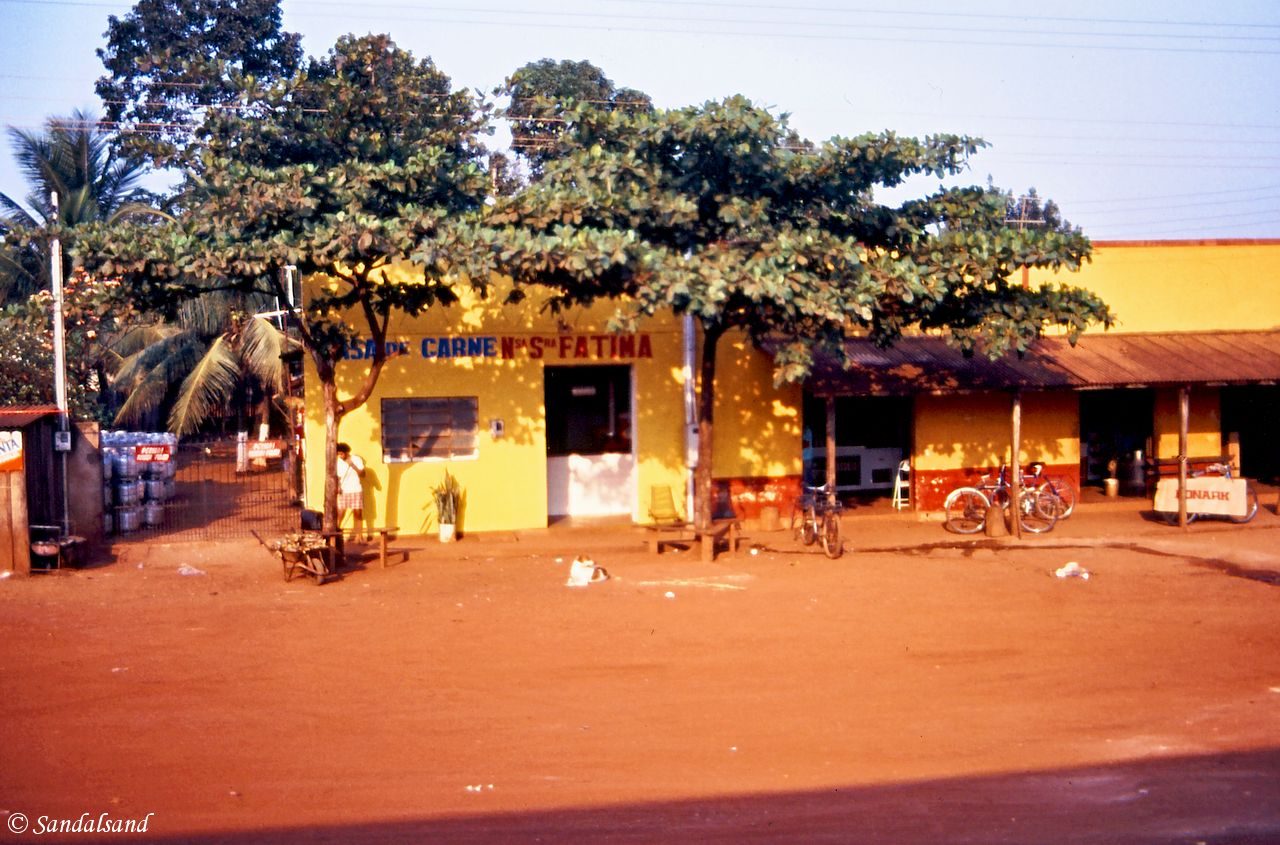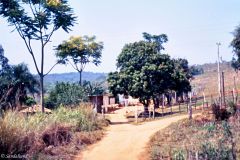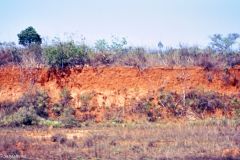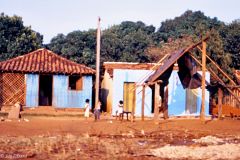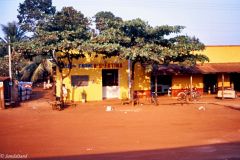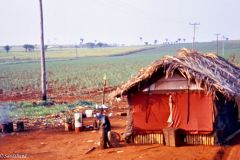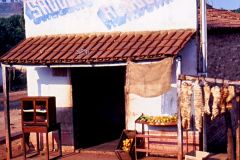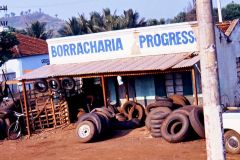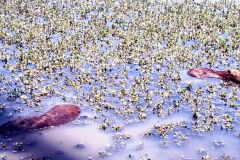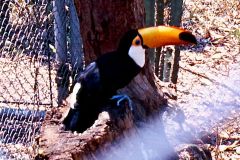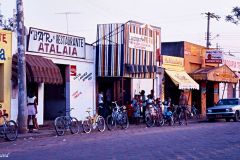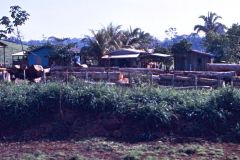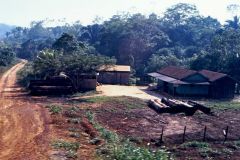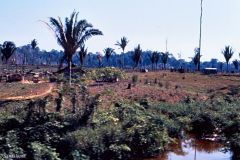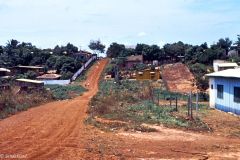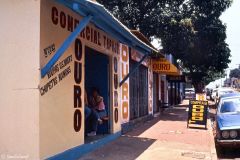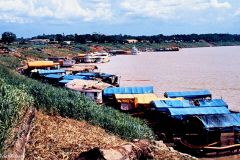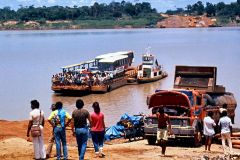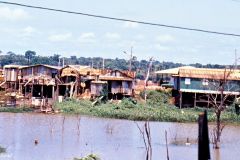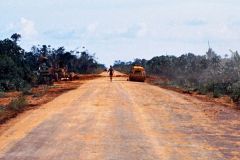The next legs of our journey brought us into the vast interior of Brazil. Key words are deforestation, gold rush and long stretches on bus.
This article is part of a travelogue from of a five month journey in 1987-1988 to several countries in South America: Brazil, Peru, Ecuador, Bolivia, Chile.
Friday 09.10.1987, Belo Horizonte – Cuiabá
And then it is off into the interior of the country. A bus trip of 26 hours may seem discouraging but it went well. We slept a few hours at night and else there was much nice scenery to watch.
The first hours, in the state of Minas Gerais, the rolling hills dominated the terrain and view. Later it became gradually flatter, and the grass lands interspersed by occasional trees and cattle, stretched for kilometres on either side of the road. When we were closing in on Cuiabá we entered an almost jungle like vegetation and the heat and humidity crept into the bus.
We made several stops on the way, in towns and at some postos (roadside restaurants). There would not be many hours between the stops, each lasting 15-20 minutes.
We passed through Uberaba, Uberlândia, Goiânia, Jataí, Mineiros, Rondonópolis and in between there were large farms – fazendas – and small farms for the poor people. The other passengers were vaccinated against yellow fever but we managed to avoid the vaccination procedure. There was luckily no control as Bo had left her vaccination card in the backpack stored away the bus luggage room. (We had both been vaccinated at home.)
Saturday 10.10.1987, Cuiabá
We arrived in Cuiabá around ten in the morning local time (11 elsewhere in Brazil) and immediately bought bus tickets to Porto Velho (24 hrs, 1045 Cz$ (17.4 USD)) with a departure tomorrow afternoon at two o’clock.
We then boarded a bus into the town centre and found:
- Hotel Avenida. Av. Getulia Vargas, next to Fenicia and Excelsior hotels. 420 (7 USD) for a double room including breakfast, bath and air-condition. It was a clean and large room.
In the afternoon we went to the tourist information office where a nice, English-speaking official offered us a lot of oral information, but little written. We then walked over to the geographical centre of the South American continent, marked by a column on a little square a bit outside the centre of town.
We finally got something to eat before exchanging some more currency. No one wanted traveller’s cheques but we managed to exchange some US dollars in cash at the Excelsior Hotel.
The city is very hot – 40 degrees in the shade, at least. Last week there was 43 degrees according to the guy at the tourist office.
We walked around half the town looking for a restaurant we never found. The Regionalissimo was recommended. There were few other places to eat, little of anything as a matter of fact.
Sunday 11.10.1987, Cuiabá
As we had a few hours to kill before the bus departure we went out to the Zoo at the University. Roberto, a regular guest at our hotel, joined us as guide. He was around 50 and had sailed the seven seas of the world, even to Norway.
The Zoo was interesting showing animals and birds from Pantanal, a huge wetland area of about 200,000 square km southwest of Cuiabá. We found the wetlands too expensive to visit.
Unfortunately Bo had a solstice (or something) in the heat and fell sick with nausea and vomiting, in combination with dizziness and in general a weak body. We took a taxi to the bus station (130 Cz$ (2.2 USD)) and she gradually recuperated.
Monday 12.10.1987, Cuiabá – Porto Velho
Impression no. 1
The bus trip yesterday passed without any drama apart from a slightly delayed departure. On the other hand it took 22 hours instead of 24.
Today impressions were all over us. Firstly, I get quite annoyed by all the bus stops in every little town with a Rodoviària situated far from the main road. Besides, roads and streets in these towns are rather poor with holes and speed bumps here and there.
Impression no. 2
Secondly, the surroundings are very interesting. This is Wild West 2! The jungle is dense not far from the asphalted road. In between farmers had scorched their plots of land and erected plain wooden shacks and in some cases even straw huts.
The towns were not much more elaborate. We actually saw a number of fires during the night and we sensed the smell of fire in many places.
The civilisation is coming to the Amazon, and so are we. The result is that the ancient rainforest is disappearing and with it much of animal life – not to talk of the ozone layer and that kind of consequences. The native population is long since eradicated and we saw very few with Indian appearance even in these areas.
Impression no. 3
Thirdly, all on the bus were vaccinated against yellow fever apart from Bo and me and a handful of others. We had papers to show from previous vaccinations. There are no medical syringes with needles around; the substance is shot into the arm with a high-pressure jet injector without the apparatus even touching the skin.
A look around Porto Velho
Porto Velho seems quite unfinished and without a structure, and is not likely as big as Cuiabá. The latter city has more than half a million inhabitants and covers an area of 12,000 square kilometres. Porto Velho has no defined centre – a strange place.
From the bus station we took the correct bus the wrong way, but we eventually arrived in the “centre” after passing through a series of less attractive neighbourhoods. A number of hotels were occupied but in the end we found:
- Guaporé Pálace Hotel. Avenida Sete de Setembro, 297. It cost us 440 cruzados (7.3 USD) for a room facing the noisy main street, hot and no fan or air condition, and with the bathroom in the corridor. Otherwise it was alright with a pleasant receptionist speaking some English. Map.
We had some trouble finding a place to eat. At the end we found a combined hamburger- and icebar where I ate and Bo became sick and had to empty her belly. Sad.
Later we walked down to the Madeira River, a big one. It is one of the largest tributaries to the Amazon. There were some boats on the river bank: Houseboats, barges, tourist boats etc. We did not join a tourist boat trip even though they were cheap (40-50 Cz$ (0.75 USD)), but darkness was about to set over the river and the view would be less interesting.
Today is a national holiday and there was some partying going on down by the river near the old railway station. There was a disco in an old warehouse with a siren going off in between the pounding of music. (Imagine having to dance in this heat.)
Tuesday 13.10.1987, Porto Velho
Not an active day. We bought a bus ticket to Manaus departing tomorrow at ten in the morning (740 Cz$ (12.3 USD). Furthermore I exchanged some traveller’s cheques through the hotel receptionist at a very favourable rate: 66. (My dollar conversions throughout are on the average rate of 60.)
We also managed to change rooms, to a room with private bath/shower, fridge, fan and zero noise. The price was 690 Cz$ (11.5 USD).
Tonight we ate good food, fish, on a boat restaurant down by the river and railway. The museum there is not particularly interesting, we merely stepped inside the front door and would have to pay to continue. There are some old carriages and locomotives outside.
The room became extremely during the night. No airing made the fan blow about the gradually hotter air.
We left the money pouch in the room when we left to eat. When we returned it had disappeared – stolen. Luckily there was little money in it.
Letter to my family
Porto Velho, Brazil, 13th of October 1987
Hello all of you in the high north!
Here in my hotel room with all the terrible traffic noise outside, I’m sitting and sweating my life out. The heat is horrible even though the clock has just ticked past ten in the morning. Bo is in bed next and is not particularly affected by the heat. She’s reading in the guidebook about Ecuador and it is not unlikely that we’ll take a swing up there from Peru in due time.
Unfortunately she’s had stomach trouble vomiting a couple of times lately and has hardly touched her food. Solstice or something like that is probably the reason. In general our health has been pretty good. Certainly not like at home, but all the same fairly satisfactory considering the conditions and our travelling.
.
And indeed we have travelled. Only the last half week we’ve had two bus trips of 24 hours each, one from Belo Horizonte to Cuiabá and from there to Porto Velho. Tomorrow we’ll board the last 24 hour leg further into the heart of the Amazon, to Manaus. There we will perhaps pick up letters, and from there we reckon on flying to Iquitos in Peru.
The impressions have poured in during the three weeks we have been away from home. It is overwhelming. Rio was a great city with enormous beaches and avenues. The traffic was big however and it felt good to move along the coast some kilometres to the south, to a smaller town.
It was a pleasant place with private beaches and old, picturesque, Portuguese colonial era buildings in a nearby town. One day we went on a boat cruise in the archipelago together with three other couples. To the big surprise of us all, all three couples were on honeymoon and had married on the same day. We dived from the boat and had a great time.
.
Back in Rio again we had dinner in a nice little fish restaurant with good home-made wine before taking a night bus to a place north and inland called Ouro Preto. “Ouro” means gold, of which this area and the province are rich. There are mines everywhere and vendors too. Many fine stones, but we didn’t buy any.
Ouro Preto is in the mountains and is very “hilly”. The urbanity is exciting with beautiful old churches and small white chalked houses with timber frames in all kinds of colours. The camera was in action. We checked into a home cosy little hotel, run by an “old” American hippie and with other backpackers as residents.
We then took a bus to Belo Horizonte, a planned large city with streets “horizontally” and “vertically”, avenues diagonally and a large park in the centre. Luckily the city was not as “modern” as Brasilia. By the way we did not go there, but instead took a bus directly west to Cuiabá, not far from Bolivia.
The buses in this country are comfortable and stop every so often, easily enabling travelling of a full day or so. On this trip the scenery was interesting and varied from mountain plateaus to flat plains and jungle as we approached Cuiabá.
.
This town is not particularly interesting, merely a stopover for travels further north. However Bo has a picture of me at the monument marking the geographical centre of South America. The heat was oppressive, 40 degrees in the shade. Thanks and praise the hotel room was air-conditioned.
It was sufficient with one night in that city and we left for Porto Velho where I’m now lying on a wet sheet writing a few lines for you in the autumn cold back home. We’ll have two nights here in order to relax, kind of, from long bus rides and little sleep.
On our way from Cuiabá we saw much of interest. This is the Wild West, number two. The government in this country is doing a lot to develop these remote areas of Brazil. The road is now asphalt paved and of a good standard. On both sides of the road the jungle stretches for kilometres on kilometres.
In between the road and the jungle are the small farms and small towns erected on recently cleared and burnt soil. A number of times we saw fires lit by settlers thereby pushing the jungle back, building the wooden shacks or straw cabins, cultivating their little patch of land.
.
The towns are highly unfinished too and so are the roads, even in the state capital of Porto Velho. Poor stuff, and rather poor people. In this town a number of stores (two thirds of all stores) trade gold. The gold rush in the area has also influenced the general price level, amongst others in our hotel.
It is not easy to communicate here in Brazil. Few people understand English or Spanish, but we manage in a way. The food is good and the portions are so big that we buy one to share, and get satisfied by that.
People are quite pleasant, but the big cities (particularly Rio) have high crime rates. Brazil has a strange mix of races: Orientals, Africans, Europeans, a few native inhabitants, and many in between.
The price level is alright, we pay three dollars each for a hotel room with private bath, shower and continental breakfast. Since I started on this letter we have changed rooms to get away from the street noise and get a fan. We pay an additional dollar each for that, but do that gladly as we save on the accommodation taking the long bus rides and also exchanged money at a particularly good black market rate today. A dinner usually costs 3 dollars for the two of us. (We have by the way a common travel chest; it is more practical that way.)
.
For the moment I can’t recall anything more to write, but I suppose I’ll take a few more notes when we arrive in Manaus, on Thursday 15th of October.
Wednesday 14.10.1987, Porto Velho to Manaus
Crossing the Madeira
The bus was a half-hour late. The lack of luggage space forced us to take our backpacks inside the bus where we luckily were able to squeeze them onto the overhead shelf.
The standard of this bus was lower than what we had become accustomed to. We were not least struck by the unusual height from the ground to the chassis. This turned out to be very sensible.
The road was paved but with a lesser quality than further south. We first had to cross the Madeira River on a strangely looking ferry, almost like a barge with a tugboat on the side. There would be four river crossings on our way to Manaus.
The jungle was everywhere and with far less people having settled around these parts. We only saw a few straw huts on the entire journey. The postos were of a considerably lower standard as well.
Problems on the bumpy road
Along the way we had an involuntary stop of 2.5 hours. The bus starting from Porto Velho four hours after us actually picked up on us. The reason was some road construction work ahead. The passengers on the bus kept telling jokes to kill some time. The jokes were apparently very funny, it’s a pity we don’t understand what they’re saying.
Later on the passengers became rather angry at the drivers who wouldn’t move on, despite a number of small and large vehicles approaching us apparently after passing the difficult road stretch.
Finally we started to roll. I have not been on an equally bumpy bus ride since the exit from Tibet in 1985. The drivers rode the bus in such a speed that they were clearly trying to make up for the time lost. For several kilometres the road was very dangerous. Large holes and mud led the bus at times to get stuck and some places to slide and loom over on the side to such a degree that we felt we were falling off the road. Exciting!
This was just what I had expected from Amazon roads. We even had a flat tire earlier in the afternoon. Strangely, they merely exchanged the flat tire with a functioning one from another bus of another company when we arrived at a posto.
Read more
The next chapter: Manaus and the jungle: We had left Porto Velho on a bus. This chapter starts with our arrival at a boat landing on the Amazon and tells our story from Manaus and a trip into the jungle fishing flesh-eating piranhas.
Read the introduction to this journey
View a full screen map of the journey

